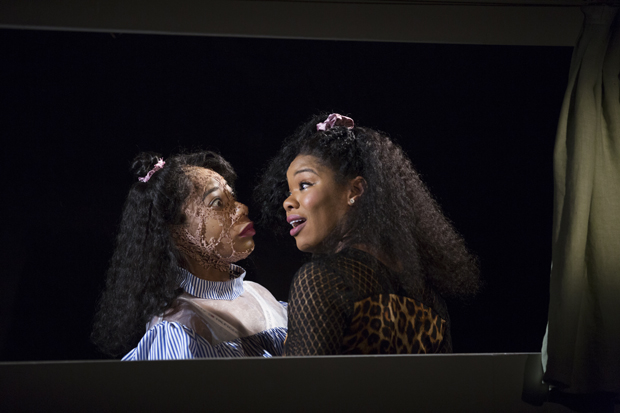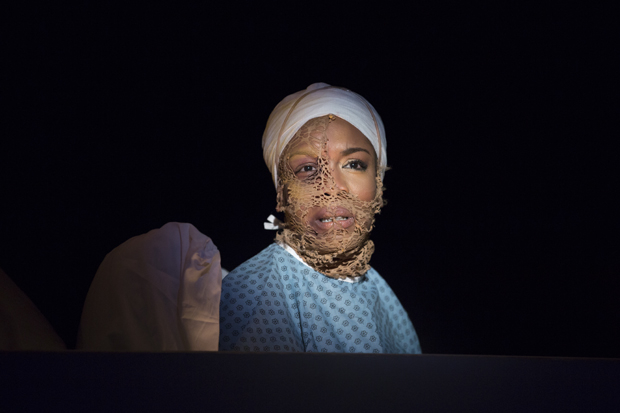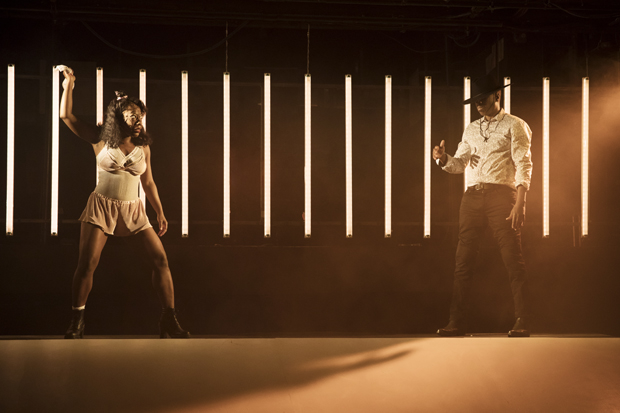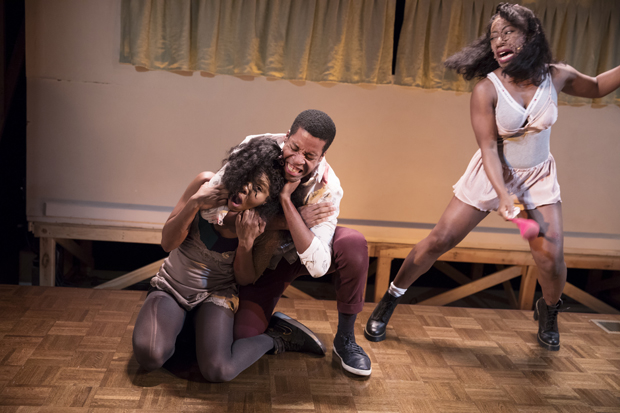God Demands a Sacrifice in Is God Is
Soho Rep. returns to its downtown theater for this world premiere by Aleshea Harris.

(© Julieta Cervantes)
An involuntary chortle rises from the audience after the very first word of Aleshea Harris's Is God Is, which is now making its world premiere at Soho Rep. "Twins," Dame-Jasmine Hughes and Alfie Fuller chant in unison, grins stretched across their faces. In Fuller's case, flesh-colored netting also stretches across her face, representing the permanent scars her character received in a childhood house fire. "Them burnin twins," they recite jauntily, like spokesmodels in a macabre chewing gum commercial. Considering its subject matter, Is God Is shouldn't be a funny play, but it often is — albeit with diminishing returns.
As they tell us right off the bat, Racine (Hughes) and Anaia (Alfie Fuller) are twins. When their father (Teagle F. Bougere) set their mother (the effortlessly spooky Jessica Frances Dukes) on fire, both girls suffered severe burns. While Racine's are on her back and can be hidden under clothes, Anaia isn't so lucky. "'Naia is trapped in a prison of sweetness," she tells us, adding, "Girl so ugly don't get to be mean." Of course, Racine is mean enough for both of them.

(© Julieta Cervantes)
While they thought their mother had perished in the fire, a letter that arrives 18 years after the incident informs them that she is still alive, but fading fast. They go to her death bed in the "Dirty South," and mom sends them on a quest to kill their father. They learn from dad's alcoholic attorney (Michael Genet) that he's living the good life in Castaic with Angie (Nehassaiu deGannes clad in mom jeans and entitlement) and their twin sons, Riley (Anthony Cason) and Scotch (Caleb Eberhardt). Before she dies, mom wants them to burn down this suburban Valhalla and bring her back the treasure within.
As the more reluctant revenger, Fuller (who really does radiate sweetness) moves gingerly through her staging. Anaia is not sure any of this is worth it. Racine, who refers to mom as "God" and is named after a French tragedian, is naturally more enthusiastic about their adventure. Hughes arms Racine with stinging diction, lashing the audience with her unfailingly precise delivery (it helps that Harris has written lines that are both poetic and witty). Her cackle is like a trumpet of war: When we hear it, we know something brutal is about to go down.

(© Julieta Cervantes)
Director Taibi Magar impressively maintains the humor embedded in Harris's script even as the blood begins to flow. Some of her stage pictures become tattooed in our memories, like dad's arrival: Eyes veiled under a wide-brimmed hat, Bougere manages to menace the room with just a curl of his mustachioed lip. Frustratingly, too many of Magar's scenes appear cramped, like a tiger forced into a tiny cage.
The surprising shifts in Adam Rigg's set keep us gasping, although not always for the best reasons (I thought a wall might collapse during one of the more vigorous fight sequences). Montana Levi Blanco's logo-emblazoned costumes shrewdly comment on the way down-market clothiers use their customers as billboards, while the ripped netting the sisters wear suggest their burns without the use of expensive and time-consuming special effects makeup. It’s a clever bit of theatrical ingenuity in a play that too often comes off as a cheap imitation of Hollywood.
In fact, between its implausible premise and action movie vibe, Is God Is feels a lot like the work of the Brooklyn-based company Vampire Cowboys, but with less imaginative fight choreography (by J. David Brimmer). Combat scenes are drawn out for maximum screaming and brutality, all of it liberally seasoned with expletives. While it may make you wince, none of it is really scary since everything is gratuitously shown (the art of horror is burlesque).
Harris's superficial treatment of the ancient theme of revenge feels like an excuse for her true passion: giddy gore topped off with a snappy throwaway line. "Lame," a character utters with his final breath. The audience laughs, but perhaps not as much as they’re meant to.

(© Julieta Cervantes)
Still, in throwing her wild punches, Harris nearly clocks something vital: Class anxiety hangs in the air of this play, a palpable fear that the poor people whose bodies you stepped over to get to your comfortable upper-middle class existence will eventually return, and you'll have to fight to the death to preserve your privilege. It is telling that Is God Is arrives at the same time as a major revival of Edward Albee's The Zoo Story, which covers similar territory.
Unfortunately, Harris and Magar seems less interested in elucidating this zero-sum violence than shoving it into an awkward box and allowing us to gawk at its grotesque extremity. We already have television and Ryan Murphy for that. The theater can do so much more.










